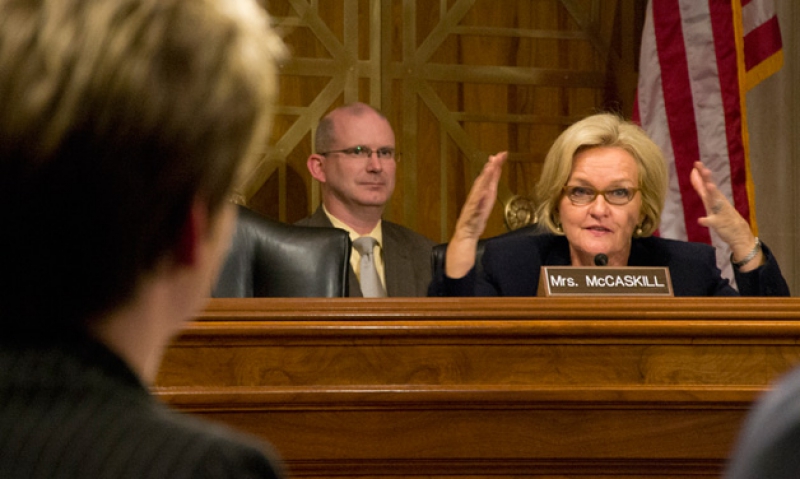
Legion staffer testifiers that organizations, individuals taking advantage of ‘gaps and loopholes’ in VA pension system to separate veterans from their hard-earned savings.
The dramatic increase in pension claims by veterans – and numerous reports of predatory practices in the private sector – were reported in American Legion testimony at a congressional hearing on aid and attendance benefits provided by the Department of Veterans Affairs.
Lori Perkio, assistant director of the Legion’s Veterans Affairs & Rehabilitation Division, testified in Washington on June 6 before the Senate Special Committee on Aging. "It has become clear America’s aging veterans are at particular risk from predatory actors," Perkio said. " These ill-intentioned organizations seek to take advantage of gaps and loopholes in the system to separate veterans from their hard-earned savings with promises of long-term care that often do not deliver as promised."
The Legion’s testimony pointed out that predatory businesses often charge veterans substantial fees for their questionable services. While these businesses may operate legally, it is unclear as to whether their practices are in the best interest of veterans and their families. Little oversight exists to control these numerous companies that claim to help veterans get their aid and attendance benefits.
When VA first began tracking pension claims separately in October 2009, there were 55,546 pension claims pending. As of last month, that number has ballooned by nearly 75 percent to 74,987. To make matters worse, this spike in claims is clearly impacting the processing times at VA’s three Pension Management Centers. Over the same time period, the number of claims pending more than 125 days (VA’s standard for what claims constitute a backlog) has more than doubled, from 15,637 in 2009 to about 35,000 current claims.
Perkio, who was an American Legion service officer for nearly 20 years, still is in regular contact with the Legion’s 2,000-plus service officers across the country who are "on the front lines, and what they see on a daily basis regarding these (predatory businesses) seeking to worm their way into the veterans elder-care industry raises serious concerns in our organization."
The Legion testimony included several examples of how veterans are being scammed by unethical business entities:
• In Alabama, a veteran and his wife were contacted regarding assistance with a local assisted-living facility. They were told their $800,000 in savings would be "diverted" to allow them to qualify for VA aid and attendance benefits. This couple contacted the Alabama VA for clarification and did not follow through with the application for Aid and Attendance, understanding they did not qualify for the pension benefit.
• In California, an organization provided assistance to a veteran, promising assistance in filing a claim for Aid and Attendance benefits in order to live at an assisted-living facility. The veteran was told he had to pay $1,700 in advance to complete the paperwork in order to receive a monthly benefit of $1,800.
• In Montana, the daughter of a veteran was working with an agency that provided a seminar at the local assisted-living facility and promised assistance to veterans and surviving spouses of wartime veterans in obtaining VA Aid and Attendance benefits. The daughter contacted the Montana Veterans Affairs Division, requesting clarification of the VA program. The company providing the assistance told her she needed to divert her father’s assets and made an appointment for her to meet with a financial advisor located more than 100 miles away.
• In Florida, American Legion service officers have run across a growing number of lawyers specializing in elder law who contact veterans directly through assisted living facilities, with promises of how to divert income and assets to qualify for VA pensions. Many of these attorneys do not provide follow-up assistance, but try to get themselves appointed as powers-of-attorney for the veterans, initiating an additional problem when veterans ultimately seek help from veterans service organizations. It can take several weeks to change a veteran’s power of attorney.
• Most of these cases involve "helping" a veteran file for his or her pension, but there is little follow-up help, as many of these organizations are not even familiar with the intricacies of VA pension eligibility and cannot provide accurate information to veterans on the best way to proceed with their claims.
• One attorney bragged, in his own newsletter, of "earning over $200,000 helping people receive VA benefits."
American Legion service officers across the country express great frustration from seeing veterans and their families, at a difficult and vulnerable crossroads in their lives, being manipulated and taken advantage of by unscrupulous organizations that often succeed in separating veterans from their assets with false promises about VA benefits.
In its testimony, the Legion said that aid-and-attendance scamming "is an issue that deserves greater scrutiny. We cannot allow these veterans to be defenseless ... when they have so selflessly offered the sacrifice of their lives and well-being in defense of this nation."
During the two and a half hour hearing, The American Legion was repeatedly lauded for its own investigation, through its network of service officers, into predatory "pension poaching". It was also pointed out that the Legion, as well as other veterans service organizations, provides VA Aid & Attendance Pension Program enrollment assistance free of charge, thus making the payment of legal fees for such aid unnecessary.
Toward the end of the hearing, Sen. Claire McCaskill, D-Mo., announced her desire to see criminal charges pressed against practitioners of "pension poaching." Sen. Ron Wyden, D-Ore., who conducted the hearing in the absence of Chairman Herb Kohl, agreed, saying, "We’re going to pursue this. We’re going to get them."
For Perkio’s written testimony, click here. To view video of the hearing, click here.
- Veterans Benefits

